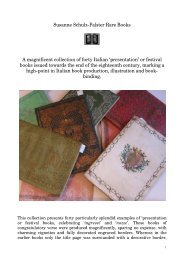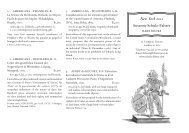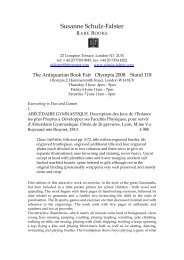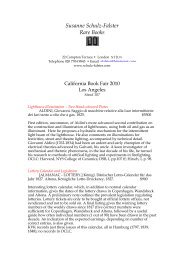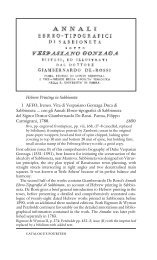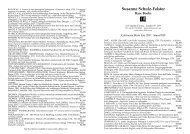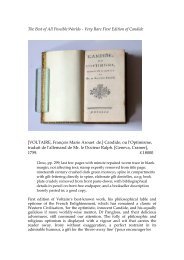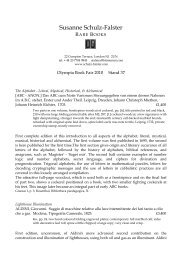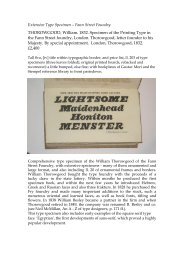Susanne Schulz-Falster Catalogue Ten - Schulz-Falster Rare Books
Susanne Schulz-Falster Catalogue Ten - Schulz-Falster Rare Books
Susanne Schulz-Falster Catalogue Ten - Schulz-Falster Rare Books
You also want an ePaper? Increase the reach of your titles
YUMPU automatically turns print PDFs into web optimized ePapers that Google loves.
Second edition, substantially enlarged, of ‘the Wrst or one of the Wrst national<br />
catalogues’ (Taylor, p. 15), and the standard bibliography of Italian<br />
books for most of the eighteenth century. Haym Wrst published his Italian<br />
bibliography under the title Notizia de Libri rari nella Lingua Italiana with a<br />
London imprint in 1726 with the original intention of listing only rare<br />
books. However, subsequent editors, beginning with Angelo Geremia, so<br />
enlarged the work that it came to be considered as a library of Italian literature.<br />
Bestermann 921; Krieg, Bibliotheca Bibliographica, 36 (1741 edition); Taylor,<br />
<strong>Catalogue</strong>s of rare books, p. 15.<br />
149 HELWIG, Joseph. Zeitrechnung zu Erörterung der Daten in<br />
Urkunden für Deutschland ... Mit einer Vorrede des Herrn Michael<br />
Ignaz Schmidt. Wien, Joseph Edlen von Kurzbek, 1787. £750<br />
Folio, pp. [viii], [x], 190, [2] errata, 13 folding printed tables,<br />
numbered A-N (table M on three leaves); engraved title vignette by<br />
Blaschke after Weinkopf; some light, insigniWcant spotting;<br />
contemporary half tan calf, spine ruled in gilt with gilt-lettered spine<br />
label; a Wne copy, with faint stamp to lower corner of title.<br />
First edition, rare, of this important contribution to the study of historical<br />
chronology and calendars in historical documents, and highly useful bibliographical<br />
tool, especially for documents relating to the Holy Roman Empire.<br />
Helwig (1730–1799), a Viennese historian and archivist points out<br />
the importance of establishing speciWc dates for historical study – even before<br />
the further confusion caused by the French revolutionary calendar.<br />
He gives comparative tables for the Gregorian and Julian calendar, for<br />
movable religious holidays, for Wxed holidays, the Roman calendar, medieval<br />
terms for speciWc holidays and their explanations.<br />
ADB XI, p. 718; Wurzbach VIII, p. 297; uncommon, NUC locates just two copies<br />
(NcU, CU), and RLIN and OCLC add no further locations.<br />
Österreich über Alles<br />
150 HERMANN, Benedikt Franz. Herrn Johann von Horneks<br />
Bemerkungen über die österreichische Staatsökonomie. Ganz<br />
umgearbeitet und mit Anmerkungen versehen... [n.p.] [Vienna,<br />
Wucherer], 1784. £680<br />
8vo, pp. [x], 253, [1] blank, [8] postscript by publisher; very clean and<br />
crisp; contemporary half calf over buV boards, spine decoratively gilt in<br />
compartments, gilt-lettered spine label; a very Wne copy, with<br />
contemporary ownership inscription to front free endpaper, and small<br />
circular stamp to verso of title.<br />
Revised and extensively rewritten edition of von Hörnigk’s classic<br />
Oesterreich über alles wann es nur will, Wrst published exactly a century earlier.<br />
DeWning the wealth and power of a country in terms of its relation to<br />
susanne schulz-falster rare books catalogue ten<br />
weaker and less powerful rivals, Hörnigk’s intention was to outline the economic<br />
policy measures necessary to assure Austria’s supremacy in the struggle<br />
of European powers. Hermann keeps Hörnigk’s basic order and chapter<br />
headings, re-writes the text, eliminates some of the redundant historical and<br />
anecdotal sections and in very extensive footnotes brings the work up-todate,<br />
especially with extensive statistical data.<br />
This appears to be a pirated version of the edition published the same<br />
year with a Berlin imprint. The publisher, Wucherer, adds an extensive<br />
postscript, defending the practice of reprints with elaborate economic and<br />
philosophical arguments.<br />
Carpenter VI, 16; Goldsmiths’–Kress 12557.4–1 suppl.; Menger c.49; see<br />
Humpert 82.<br />
Elocution and Articulation<br />
151 HERRIES, John. The Elements of Speech. London, Edward<br />
and Charles Dilly, 1773. £800<br />
8vo, pp. xvi, 259; large folding printed table (short tear at inner fold)<br />
bound in; uncut in contemporary half calf, gilt-lettered spine label;<br />
corners bumped and edges rubbed, some wear to marbled paper sides; a<br />
clean and crisp copy.<br />
First edition of one of the most important eighteenth century treatises on<br />
elocution, with a detailed treatment of articulation. Herries (died 1781), an<br />
itinerant lecturer who taught at Dublin, Edinburgh, Oxford and London,<br />
concentrates on the mechanisms of speech production. He deals with the<br />
physiology of the organs of speech, the classiWcation of sounds, formation<br />
of vowels, the alphabet, cultivation of the voice in children, speech impediments,<br />
and teaching the deaf and dumb. His advice on correct breathing,<br />
emphasis and eVective delivery is useful for the public speaker, singer, or<br />
actor alike.<br />
Alston VI 373; ESTC t8393.<br />
Critique of the Anti-Machiavel<br />
152 HESS, Heinrich Ludwig von. Historische und Politische<br />
Anmerkungen über den Antimachiavel. Wismar und Leipzig, Joh.<br />
A. Berger, 1751. £950<br />
8vo, pp. [xvi], 494; title vignette; contemporary full sheep, spine gilt in<br />
compartments, a little rubbed, spine label missing, but lettering in blind<br />
directly to spine; a clean and crisp copy.<br />
First edition of this close reading of the Frederick the Great’s Anti-<br />
Machiavel, his enlightenment response to Machiavel’s Prince, which can be<br />
summed up in the famous sentence ‘the prince is not the absolute master,<br />
but only the Wrst servant of his people’. Hess carefully goes through the text<br />
chapter by chapter and annotates it with further observations and comments<br />
by classical and enlightenment philosophers. Hess (1719–1784), a



